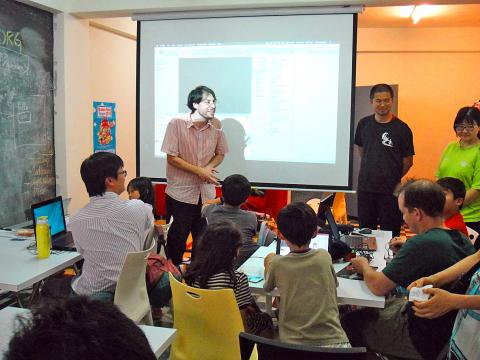Gone are the days of the illegible strings of numbers, letters and symbols running across your monitor. Computer programming, which in the past was reserved for the brilliant minded, is now made easy with intuitive programs where users can click on buttons to automatically generate code.
Simple, colorful platforms such as Scratch and Blockly have enabled even young children to code and create video games.
Now, there are global movements like Hour of Code and CoderDojo that create opportunities for young people to learn computer programming. CoderDojo reached Taipei on May 31 when a few programmers set up a free Scratch workshop at Taipei Hackerspace for those between the ages of seven and 17. The class takes place every two weeks, with the next one on Sunday. The beginner class starts at 10am and the advanced class starts at 2pm. Space is limited, and online reservations are required.

Photo courtesy of CoderDojo Taipei
Organizer and instructor Vincent Cantin says he and a few other people had already been thinking of teaching children computer science when someone posted on the CoderDojo Web site asking if anybody was willing to host one in Taipei.
After the first event, Cantin divided the students into two sessions due to the disparity among their skill levels.
The second event saw several returnees — one of whom even brought a friend. The students created a “rock, paper, scissors” game — the beginner group made a straightforward version while the advanced group created one where players accumulated points through multiple matches.
The classes are laid back, with having fun as the main goal. Cantin says students are encouraged to learn on their own pace and suggest topics for the next sessions. They also share their work on the CoderDojo Facebook page.
Cantin says computer programming is a skill as well as a means of self-expression.
“It also prepares kids to better understand what a computer is, what it can and cannot do and how to make it do what they want,” he says, noting that today’s youth should not only learn to use computers but control them.
While there is a strong software engineering culture in Taiwan among adults, many children don’t have the resources to explore the subject or socialize with like-minded individuals.
Cantin wants the event to become a club where children “will not only learn how to program, but also where they can develop their sense of creation, self-initiative and interpersonal communication.”
With the number of volunteers growing, he hopes that he can eventually expand the classes and also help others organize events.

On April 26, The Lancet published a letter from two doctors at Taichung-based China Medical University Hospital (CMUH) warning that “Taiwan’s Health Care System is on the Brink of Collapse.” The authors said that “Years of policy inaction and mismanagement of resources have led to the National Health Insurance system operating under unsustainable conditions.” The pushback was immediate. Errors in the paper were quickly identified and publicized, to discredit the authors (the hospital apologized). CNA reported that CMUH said the letter described Taiwan in 2021 as having 62 nurses per 10,000 people, when the correct number was 78 nurses per 10,000

As we live longer, our risk of cognitive impairment is increasing. How can we delay the onset of symptoms? Do we have to give up every indulgence or can small changes make a difference? We asked neurologists for tips on how to keep our brains healthy for life. TAKE CARE OF YOUR HEALTH “All of the sensible things that apply to bodily health apply to brain health,” says Suzanne O’Sullivan, a consultant in neurology at the National Hospital for Neurology and Neurosurgery in London, and the author of The Age of Diagnosis. “When you’re 20, you can get away with absolute

May 5 to May 11 What started out as friction between Taiwanese students at Taichung First High School and a Japanese head cook escalated dramatically over the first two weeks of May 1927. It began on April 30 when the cook’s wife knew that lotus starch used in that night’s dinner had rat feces in it, but failed to inform staff until the meal was already prepared. The students believed that her silence was intentional, and filed a complaint. The school’s Japanese administrators sided with the cook’s family, dismissing the students as troublemakers and clamping down on their freedoms — with

As Donald Trump’s executive order in March led to the shuttering of Voice of America (VOA) — the global broadcaster whose roots date back to the fight against Nazi propaganda — he quickly attracted support from figures not used to aligning themselves with any US administration. Trump had ordered the US Agency for Global Media, the federal agency that funds VOA and other groups promoting independent journalism overseas, to be “eliminated to the maximum extent consistent with applicable law.” The decision suddenly halted programming in 49 languages to more than 425 million people. In Moscow, Margarita Simonyan, the hardline editor-in-chief of the